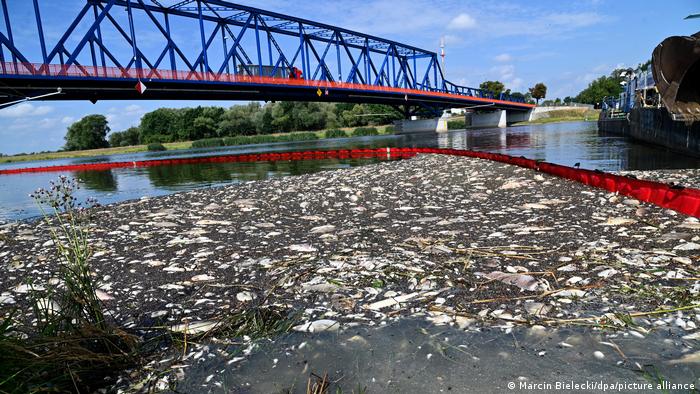
Experts are still trying to determine the cause of death of thousands of fish last week in the Oder River that borders Germany and Poland, this time in the vicinity of the eastern city of Frankfurt (Oder).
The reports came just two weeks after Polish anglers reported removing tons of dead fish from the Oder near the town of Olawa, about 300 kilometers (186 miles) upstream from the more recent fish die-off.
At the time of the reports in Poland, water authorities based in the nearby Polish city of Wroclaw detected a toxic substance in two locations on the Oder that is likely the solvent mesitylene, which is known to have a harmful effect on fish. However, subsequent tests have shown no trace of the substance.
Mercury was also identified as a potential culprit for the more recent die-off. But Polish Environment Minister Anna Moskwa said on Sunday that "completed fish tests for mercury and heavy metals" proved to be negative. Lab tests did show high levels of salinity in the water.
Local authorities have warned residents, along with their pets and livestock, not to touch the river water.
Still no proof of poison
While German and Polish authorities believe contamination is the cause of the die-off, political leaders who met on Sunday said water tests gave no definitive proof of high toxicity in the river.
"As of today, none of these tests have confirmed the presence of toxic substances," Anna Moskwa said after meeting with German Environment Minister Steffi Lemke on Sunday in Szczecin, a city in north-west Poland.
A joint taskforce looking into the cause of the mass fish die-off was also announced at the meeting.
Tests for pesticides and around 300 other substances are also being conducted, the Polish environment minister said.
"We still do not exclude a variant of the toxic substances," she added. "We are checking entities which run business and industrial activity along the river."
Meanwhile, no fish carcasses have yet been sighted downstream in the state of Mecklenburg-Vorpommern on the German Baltic coast, officials said.
This follows reports that oil booms will be placed in the Szczecin Lagoon, fed from the Oder, to prevent the dead fish from entering the Baltic Sea.